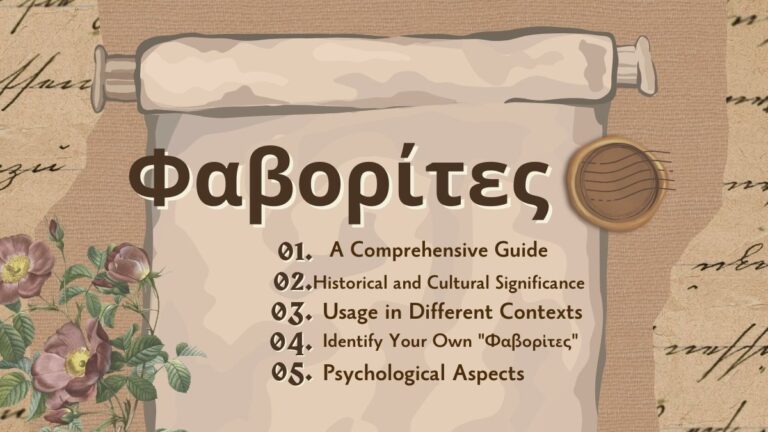When diving into the realm of language and culture, certain terms can intrigue and inspire curiosity. One such term is “φαβορίτες” (pronounced “favorités”), which translates to “favorites” in English. This article explores the nuances of this term, its usage in different contexts, and its significance in various aspects of life.
Introduction to “Φαβορίτες”
“Φαβορίτες” is a Greek word meaning “favorites.” It often appears in discussions about preferences, whether in sports, entertainment, or personal choices. Understanding how and when to use this term can enrich your comprehension of Greek culture and language.
Historical and Cultural Significance
Origins of the Term
The term “φαβορίτες” has roots in the concept of favoritism, which has been present throughout history in various cultures. It reflects the human tendency to favor certain people, things, or ideas over others.
Cultural Context
In Greek culture, “φαβορίτες” can refer to preferred choices in many aspects of life, including food, sports teams, and even political figures. This term is deeply embedded in social interactions and cultural practices.
Usage in Different Contexts
In Sports
In the world of sports, “φαβορίτες” refers to the favored teams or athletes predicted to win. For example, if a team is considered the favorite to win a championship, they are often referred to as “φαβορίτες” in Greek sports discussions.
In Entertainment
In entertainment, whether it’s movies, music, or books, “φαβορίτες” denotes the most liked or popular choices. Fans may refer to their favorite actors, songs, or authors as their “φαβορίτες.”
In Personal Preferences
On a personal level, everyone has their own set of “φαβορίτες” – things they prefer or enjoy more than others. This can include favorite foods, hobbies, or places to visit.
Examples of “Φαβορίτες” in Action
Sports Teams
Imagine a major soccer tournament. The team with the highest chance of winning, based on previous performances and expert opinions, is labeled as the “φαβορίτες.”
Movies and Music
When discussing films or music, fans often have their own “φαβορίτες” – those particular films or songs they return to repeatedly.
Everyday Choices
Consider someone’s favorite restaurant or their go-to recipe. These personal favorites are everyday examples of how “φαβορίτε’ς” are part of daily life.
How to Identify Your Own “φαβορίτε’ς”
Reflect on Preferences
To identify your own “φαβορίτε’ς,” think about the things you consistently prefer over others. This could be anything from your favorite book to your preferred brand of coffee.
Consider Frequency
What do you gravitate towards most often? The items or choices you return to repeatedly are likely your “φαβορίτε’ς.”
The Impact of “Φαβορίτες” on Decision Making
Influence on Choices
Our “φαβορίτε’ς” significantly influence our decisions, from what we purchase to where we travel. This personal bias shapes our experiences and preferences.
Psychological Aspects
Favoritism can also reveal underlying psychological patterns, such as comfort-seeking or habitual behavior. Understanding your “φαβορίτε’ς” can provide insights into your preferences and decision-making processes.
Common Misconceptions About “φαβορίτε’ς“
Misunderstanding Favoritism
Favoritism often gets a bad rap, but it’s a natural part of human behavior. Everyone has their preferences, and recognizing this can help in understanding personal and social dynamics.
Assuming Universal Appeal
Just because something is a “φαβορίτε’ς” for one person doesn’t mean it will be for everyone. Personal preferences are subjective and vary widely.
How to Embrace and Respect Others’ “Φαβορίτες”
Respecting Diverse Preferences
Understanding that everyone has their own “φαβορίτε’ς” helps in respecting diverse tastes and opinions. This can lead to more harmonious interactions and a greater appreciation of different perspectives.
Celebrating Differences
Rather than focusing on differences as a barrier, celebrate them. Embrace the unique “φαβορίτε’ς” of others as a way to enrich your own experiences and broaden your horizons.
The Future of “φαβορίτε’ς”
Evolving Preferences
As trends and personal tastes evolve, so do “φαβορίτε’ς.” What’s popular today might change tomorrow, reflecting the dynamic nature of human preferences.
Technological Influence
With technology rapidly advancing, new tools and platforms influence what becomes a “φαβορίτες” in entertainment, shopping, and other areas of life.
Conclusion
Understanding the concept of “φαβορίτες” provides a glimpse into human preferences and cultural nuances. Whether it’s favorite sports teams, movies, or personal choices, this term encapsulates the essence of favoritism in various contexts. Embracing and respecting different “φαβορίτε’ς” can lead to richer, more inclusive experiences and interactions.
FAQs
What does “φαβορίτες” mean?
“Φαβορίτες” is Greek for “favorites,” referring to things or people that are preferred over others.
How can I identify my own “φαβορίτες”?
Reflect on your consistent preferences and the things you often choose or enjoy.
Are “φαβορίτες” the same for everyone?
No, personal favorites vary widely between individuals based on tastes and experiences.
How does favoritism affect decision-making?
Favoritism influences decisions by guiding us towards our preferred choices and experiences.
Why is understanding “φαβορίτες” important?
Understanding “φαβορίτες” helps in appreciating personal and cultural preferences, enhancing interpersonal relationships and decision-making.

